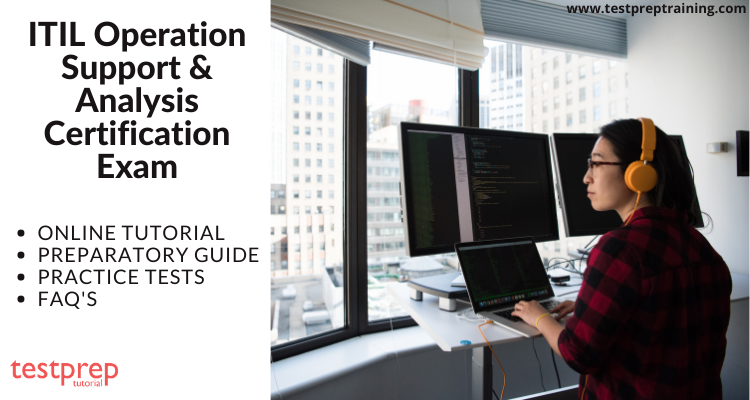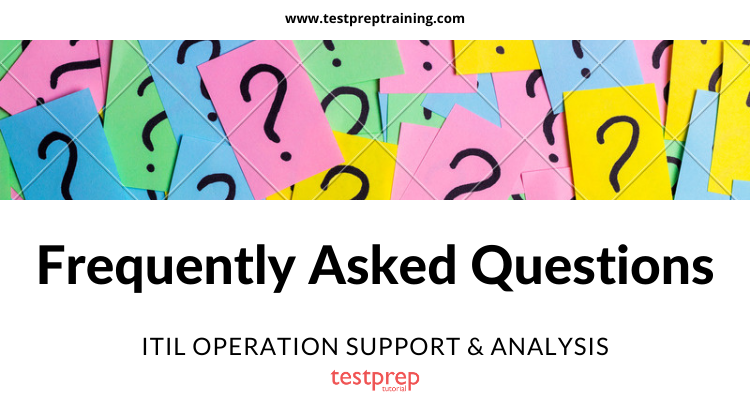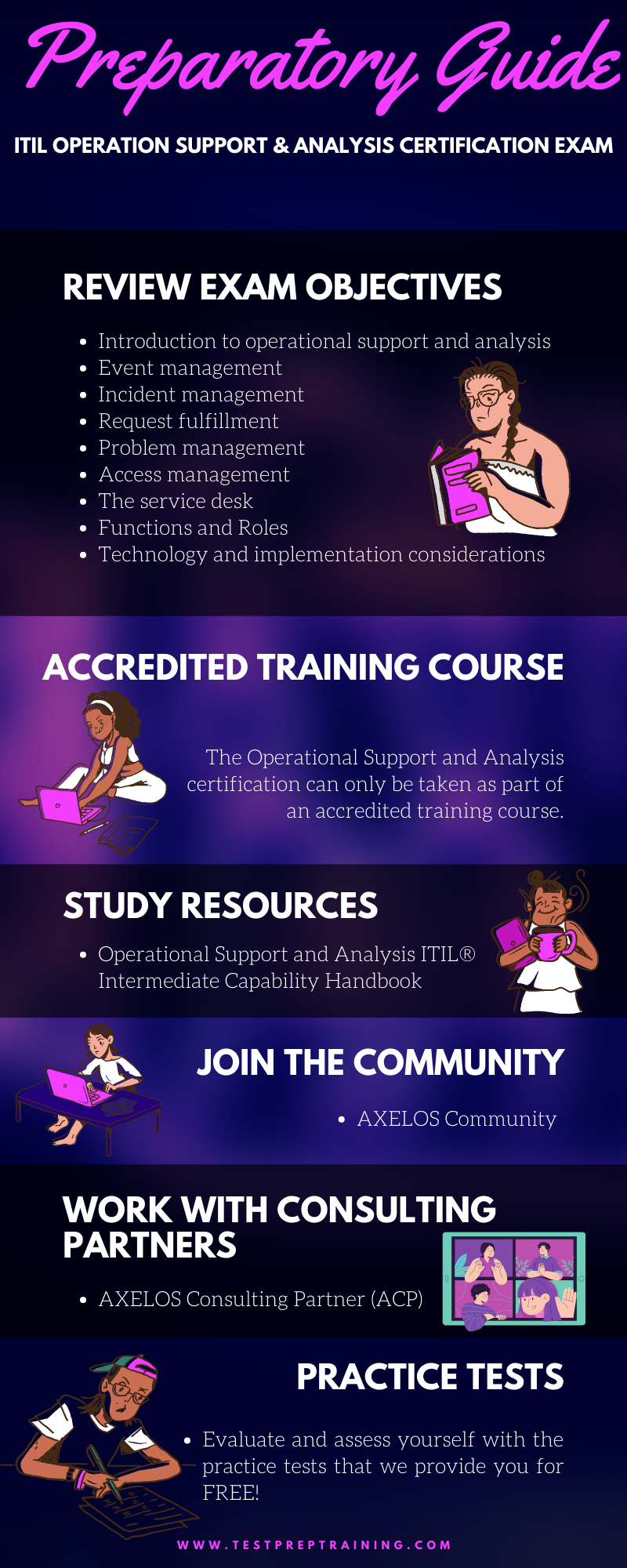ITIL Intermediate Module – Operational Support and Analysis

The ITIL Operational Support and Analysis (ITIL OSA) module is one of the certifications in the ITIL® Service Capability workstream. The purpose of this training module and the associated exam and certificate is, respectively, to impart, test, and validate the knowledge on industry practices in service management as documented in the ITIL Service Lifecycle core publications. The exam focuses on the practical application of OSA practices in order to enable event, incident, request, problem, access, technical, IT operations, and application management. The content of the module is based mainly on the best practice guidance contained in the ITIL Service Operation publication.
It also covers issues relating to the people, relationships, procedures and infrastructure technology required to ensure that the organization or programme can provide the high quality and cost-effective IT services that are required to meet organizational needs.
Target Audience
The target group of the ITIL Intermediate Qualification: Operational Support and Analysis Certificate includes, but is not restricted to:
- Firstly, IT professionals
- Secondly, Business managers
- Thirdly, Business process owners
- Fourthly, Individuals who require a deep understanding of the ITIL Certificate in the Operational Support and Analysis processes and how it may be used to enhance the quality of IT service support within an organization
- Furthermore, IT professionals who are working within an organization that has adopted and adapted ITIL and who need to be informed about, and thereafter contribute to, an ongoing service improvement program
- Then, Operational staff involved in the event management process, incident management process, request fulfillment process, problem management process, access management process, service desk, technical management, IT operations management and application management, and who wish to enhance their role-based capabilities
- Moreover, Individuals who have attained the ITIL Foundation Certificate in IT Service Management and wish to advance to higher level ITIL certifications
- Also, Individuals seeking the ITIL Expert Certificate in IT Service Management for which this qualification can be one of the prerequisite modules
- Lastly, Individuals seeking progress toward the ITIL Master Certificate in IT Service Management for which the ITIL Expert is a prerequisite.
Pre-Requisite to the Exam
Candidates wishing to be trained and examined for this qualification must already hold the ITIL Foundation Certificate in IT Service Management which must be presented as documentary evidence to gain admission.
Candidates who hold the following ITIL qualifications are also eligible, and similar evidence will be required:
- Firstly, earlier ITIL (V2) Foundation plus Foundation Bridge
- Secondly, ITIL Expert Certificate in IT Service Management (achieved via Service Manager or Practitioner bridging routes).
ITIL OSA Exam Details
| Exam Name | ITIL Operational Support and Analysis |
| Level of the Exam | Intermediate Level |
| Exam Format | 8 multiple-choice, scenario-based, gradient-scored questions Each question will have: – 4 possible answer options – one which is worth 5 marks – one which is worth 3 marks – one which is worth 1 mark – one which is a distracter and achieves no marks |
| Number of Questions | 8 questions per page |
| Exam Duration | 90 minutes |
| Exam Type | Closed Book |
| Maximum Marks | 40 |
| Passing Marks | 70% (28/40) |
| Exam Language | Brazilian Portuguese Danish English French German Japanese Spanish (Latin American) |
Frequently Asked Questions: ITIL OSA
Find answers to all the questions you’ve been looking for about the ITIL OSA exam HERE!

Course Outline
Learning Unit OSA01: Introduction to operational support and analysis
Bloom’s Level 2 Objectives – Full understanding of Operational Support and Analysis (OSA) terms and core concepts.
- The value to the business of OSA activities
- The lifecycle within the OSA context
- Optimizing service operation performance.
Learning Unit OSA02: Event management
Bloom’s Level 4 Objectives – The knowledge, interpretation, and analysis of event management principles, techniques, and relationships and the application of them to the operation of effective service solutions.
- The event management process inclusive of its design strategy, components, activities, and operation including its organizational structure, as well as any interfaces with other processes
- Furthermore, Efficient event management and provision of examples showing how it is used to ensure service quality within OSA
- The benefits and business value that can be gained from event management.
Learning Unit OSA03: Incident management
Bloom’s Level 4 Objectives – The knowledge, interpretation, and analysis of incident management principles, techniques, and relationships and the application of them to the support and operation of effective service solutions.
- The incident management process inclusive of its components, activities, and operation including its organizational structure, as well as any interfaces with other processes
- Furthermore, The measurement model and the metrics that would be used to support incident management within OSA practices
- The benefits and business value that can be gained from incident management.
Learning Unit OSA04: Request fulfillment
Bloom’s Level 4 Objectives – The knowledge, interpretation, and analysis of request fulfillment principles, techniques, and relationships and the application of them to the support and operation of effective service solutions
- The request fulfillment process inclusive of its components, activities, and operation including its organizational structure, as well as any interfaces with other processes
- Also, The measurement model and the metrics that would be used to support incident management within OSA practices
- Moreover, The benefits and business value that can be gained from request fulfillment as related to OSA.
Learning Unit OSA05: Problem management
Bloom’s Level 4 Objectives – The knowledge, interpretation, and analysis of problem management principles, techniques, and relationships and the application of them to the support and operation of effective service solutions.
- The end-to-end process flow for problem management inclusive of problem analysis techniques, error detection, components, activities, and operation including its organizational structure, as well
- as any interfaces with other processes
- A measurement model and the metrics that would be used to support problem management within OSA practices
- The benefits and business value that can be gained from problem management.
Learning Unit OSA06: Access management
Bloom’s Level 4 Objectives – The knowledge, interpretation, and analysis of access management principles, techniques, and relationships and the application of them to the support and operation of effective service solutions.
- The end-to-end process flow for access management process inclusive of components, activities, and operation including its organizational structure, as well as any interfaces with other processes
- A measurement model and the metrics that would be used to support access management within OSA practices
- The benefits and business value that can be gained from access management as related to OSA.
Learning Unit OSA07: The service desk
Bloom’s Level 4 Objectives – The knowledge, interpretation, and analysis of service desk principles, techniques, and relationships and the application of them to the support and operation of effective service solutions.
- The complete end-to-end process flow for the service desk function inclusive of design strategy, components, activities, and operation, as well as any interfaces with other processes or lifecycle phases
- The service desk validation components and activities (e.g. service desk role, organizational structures, challenges, issues safeguards, etc.) and how these test components are used to ensure service quality within OSA
- A measurement model and the metrics that would be used to support the service desk function within OSA practices.
Learning Unit OSA08: Functions and Roles
Bloom’s Level 4 Objectives – The knowledge, interpretation and analysis of OSA principles, techniques and relationships and the application of them to the support and operation of effective service solutions
- The end-to-end process flow for OSA functions (i.e. technical management, IT operations management, and applications management) inclusive of design strategy, objectives, components, activities, roles, and operation including its organizational structure, as well as any interfaces with other processes
- Also, The roles within each OSA process and generic roles
- The benefits and business value that can be gained from functions as related to OSA.
Learning Unit OSA09: Technology and implementation considerations
Bloom’s Level 4 Objectives – The knowledge, interpretation, and analysis of technology and implementation and the application of them for the effective management of OSA.
- Technology requirements for service management tools and where/how they would be used within OSA for process implementation
- What best practices should be used in order to alleviate challenges and risks when implementing service management technologies.
Preparatory Guide – ITIL OSA Exam

Review Exam Objectives
Knowing the exam objectives is very important to get an insight into the exam. A thorough analysis will let you align yourself more deeply with the chief objectives of the exam, hence, enabling you to gain the required command to earn your desired certification. Below are the major domains of the course outline for the exam:
- Firstly, Introduction to operational support and analysis
- Secondly, Event management
- Thirdly, Incident management
- Fourthly, Request fulfillment
- Also, Problem management
- Then, Access management
- Furthermore, The service desk
- Moreover, Functions and Roles
- Lastly, Technology and implementation considerations
Accredited Training Course
The Operational Support and Analysis certification can only be taken as part of an accredited training course. The OSA course can teach organizations and individuals how to manage the everyday operation of IT services and gain a better understanding of how to implement the ITIL processes that will enable them to deliver and support services to customers. This will ultimately help in qualifying for the certification exam.
Study Resources
Updated in line with the ITIL 2011 editions and the Operational Support and Analysis (OSA) syllabus, Operational Support and Analysis ITIL® Intermediate Capability Handbook, the quick-reference guide will help you as you study for the OSA module of the ITIL Intermediate Capability qualification. Beyond the exam, this handbook is a practical resource that can be used in the workplace. Companion volumes covering the other Intermediate Capability modules are also available.
Join the Community
Here you can see all the great content that AXELOS Community has to offer, as well as all the AXELOS Blog Content! If you want to submit something to the Community feed, just get in touch. When you’re done here, remember to visit the AXELOS Community Forums!
Being in touch with the community, you can learn so much more that will ultimately add to your preparation for the exam.
Work with Consulting Partners
You can use the AXELOS Consulting Partner (ACP) service to find established, reputable experts who can help you to diagnose organizational issues, develop your capabilities, and enable continual improvement. Working with these consulting partners will contribute greatly to your learning as well as preparation for the test.
Practice Tests
Last but not the least, practicing! Attempting practice tests complete your preparation for the examination. Evaluate and assess yourself with the practice tests that we provide you for FREE!

